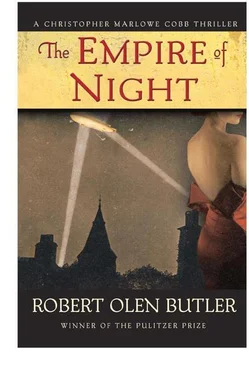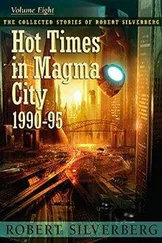I pushed in, closed the door, put my tools away. The room was large. The footprint of the tower, I figured. The mullioned casement windows faced east and south, mostly filling those two walls, and were dim with the moonless night. I had to be careful about my flashlight.
But I did need it.
I let my eyes adjust, let them prepare to use what little outside glow there was. I could see the form of a massive desk set parallel to the wall that held the door to the room.
I moved to its opposite side, faced it, putting my back to the southern windows. The guards were more likely arrayed in that direction, with the south facade holding a major entrance to the castle. I was standing well away from any possible sight line from the ground. With my body blocking the beam, I switched the flashlight on.
From its top, the desk certainly seemed to be a working desk. Neatly kept, but it was in use. There was an electric table lamp; a crystal ink well with a dip-pen holder; a large, leather-edged desk pad with a blotter surface and the intense hieroglyphs of backward, superimposed, blotted words. In a wire basket sat a dozen pieces of mail addressed to Stockman, some of them by way of the House of Parliament, most of them to Stockman House or simply to his name and Margate. Or Broadstairs. Or Kent. One was stamped but addressed only to Sir Albert Stockman. A hodgepodge of hands, some elegant, some seeming barely literate. There was a comparable, empty basket. One for incoming mail and one for outgoing.
I circled the desk. I sat in the massive, polished oak rotary chair. I shined my light on the desk drawers, opening them one at time. They were filled with everyday things. Pen nibs. A staple fastener. A stash of mailing envelopes, unused. I looked in each, though from the first pull I knew I’d find nothing of importance: the drawers were all unlocked.
I rose. I stood away from the desk.
Of course this wouldn’t be easy.
This was the MP’s desk. His constituent desk.
His serious stuff could still be hidden elsewhere in the office. He saw this as a secure room, on a secure floor, in a secure house with a private army. I shined my light toward the western wall. Half a dozen four-drawer filing cabinets. Wooden. Clearly also unlocked. He had a file on everybody in his constituency. He had files on his other MPs. Whatever else. And a set of files in there somewhere, perhaps, revealing his unholy ties to Germany but hiding in plain sight. It could take all night to find them.
Applause and cheers wafted faintly into the room from far away.
And the music again. Some damn music hall ditty. Mother would play that one to the hilt.
I turned my light to the wall behind the desk. I’d noted vaguely that it was full of books. My light went to these high shelves, to the top, at the far left, and I began quickly to scan, my hand doing this almost on its own, disappointed from the library downstairs. Codes still in my head, I supposed.
More sets. Sets and sets. Law books here. And then some other sets. Kentish matters no doubt. Sets on agriculture. Sets about hops and cherries and cattle and fish and whatever else.
I was scanning down the center section now, directly behind the desk. Sets. Sets. I needed to look elsewhere.
And then the books abruptly changed.
Not sets. Odd volumes, a whole row of them, directly behind and slightly above the desk chair.
I circled the desk again.
I looked at titles.
The British Almanac and Family Cyclopaedia.
Appleton’s Annual Cyclopaedia.
The Dictionary of English History.
The New International Year Book for 1913.
I had not seen a set of The New International Encyclopaedia. Even if there was one somewhere, its yearbook was separated. These were all books that made finding words easy. They all went from A to Z. Code books for telegraph messages.
My flashlight moved on. Quickly. Past several volumes. I knew what I was looking for. And there it was.
The Nuttall Encyclopaedia of Universal Information .
The books were set in here as they were downstairs. And on that quarter of an inch of exposed shelf in front of Nuttall was a thin layer of dust.
Since I last knew it to be the book of the week or month or whatever the interval of use was, the Huns had moved on from this Concise and Comprehensive Dictionary of General Knowledge edited meticulously by the good Rev. James Wood. It was my first German code book and I felt a little nostalgic for it. How sad for its dusty lip.
I went back and wrote all these titles in my notebook. The German library of telegraphic code books. This was a good night’s work in itself.
The second time through, something finally registered on me that I’d rushed past looking specifically for Nuttall. An empty space.
After recording all the titles, I returned to it. By the width of one volume, the shelf was wiped clean all the way through the outer lip.
A recent withdrawal.
One code book wasn’t here.
And now the obvious thought, delayed by my focus on documents, finally struck me: the wireless set wasn’t here either.
Its antenna was directly above me.
I looked up into the dark.
There had to be a room above this office.
The question was how to get there.
And something else struck me at last. I turned my light back to the western wall and the line of filing cabinets. I’d assumed the entrance door to this office was farther east than the entrance doors on lower floors because this room was larger. It wasn’t. That wall my white light was drilling into was too close. This room was not a footprint of the tower. It was too small.
I rose. I moved to the end filing cabinet. It was set six inches or so from the wall, as were all these cabinets. I shined my light behind them. Solid wall.
I moved to the door. But before I opened it, I looked back to the western wall. I put the heel of my foot at the edge of the doorjamb and did a yard-stride to the corner. Five paces. About fifteen feet.
I went back to the door. I put my hand to the knob.
I turned stupid. I opened the door and stepped out and immediately before me the shadows had bulked up into the form of a man.
Before I could even twitch I felt the barrel of a pistol press into the dead center of my gut.
Outside, the crowd cheered.
“This is just to keep you from being stupid,” a cigarette-blasted British voice said, pushing a little on the pistol.
“Too late,” I said.
“Very well,” he said. “From carrying on being stupid.”
“That’s big of you,” I said.
“Very slowly upend that light of yours and have a look at me,” he said.
I did. The beam came at a sharp angle from below, turning him into a chiaroscuro: a wide, central, corpse-white stripe of a face surrounded by a night-black skull.
It was the lug from the Duke of York’s.
“Mr. Catwalk,” I said.
“Mr. Front Row,” he said.
“You prowl for your boss, I take it,” I said.
“And who do you fancy my boss to be?” he said.
“Stockman.”
“You are mistaken, Mr. Cobb,” he said, his voice pitched down and sounding convincing.
I tried to place this guy in the class system. He sounded, at turns, cultured and working class, never quite either, which meant he was the latter with extended exposure to the former.
It struck me. “You’re Buffington’s man.”
“Lord Buffington,” he corrected.
“You’re the guy in the vicinity.”
“Very near,” he said. “Thanks to the baronet’s need for a bit of outside assistance.”
“At the theater then, you were what?”
“Watching over Isabel Cobb. You and I are on the same side, sir.”
Читать дальше












